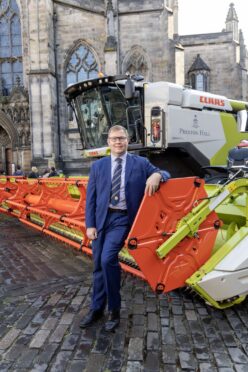The Royal Highland Agricultural Society of Scotland (RHASS) has revealed a loss of £3.6 million in 2023 on the back of a £1.2 million loss in 2022.
Following the publication of this year’s annual accounts at the society’s annual general meeting on Thursday, members were left concerned over the gap between total income and expenditure.
Total income in 2023 rose by 5% to £11,532,053 while expenditure jumped to £15,383,679, up from £12,237,468 in 2022.
The society said its board of directors made a clear decision to support its exhibitors, members and visitors by “holding down prices”.
Expenditure increased to £15,383,679 in 2023
Knowing that costs would outweigh income, a planned deficit of £2.6 million was agreed. However, the society says the cost of living crisis, rising inflation and other economic factors led to a larger deficit than budgeted for.
RHASS also pointed the blame towards its pre-Covid commitment to last year’s world famous Golden Shears event which cost the society a whopping £494,000.
The society says this was a substantial increase against the originally committed investment and was down to a rise in accommodation costs.
Expenditure on show-related activities in 2023 increased from £5.9 million in 2022 to £8.5 million.
This included the inaugural Hoolie music event at £539,581, which struggled to leave a profit, RHS TV at £259,645 and £492,981 on payroll and related costs, up from £222,297 in the previous year.
£8.5 million of expenditure spent on show-related activities
Funds put towards prizes and awards for exhibitors in 2023 also rose by more than £100,000 on the year to £296,417.
A number of members were quick to question the board on its increased staffing costs of £520,000 on the year, with wages and salaries for 2023 sitting at almost £2 million, up from £1.3 million the previous year.
The monthly average number of employees during 2023 was 49 (45 permanent and 4 temporary) against 38 in 2022 (37 permanent and 1 temporary).
Wages and salaries hit almost £2 million
Of that 49 permanent staff, one is paid between £170,000-£179,999; one at £100,000-£109,999; another between £80,000-£89,999; and a fourth at £70,000-£79,999.
One person in the room argued that performance from staff hadn’t been there and another questioned whether the team had the correct skillsets to deliver.
Another asked the board whom did they consider to be at the top of RHASS, the well-salaried chief executive or the volunteering team of directors.
Alan Laidlaw, RHASS chief executive said: “We are not a bog-standard organisation operating at a bog-standard level. We are trying to compete with salaries being paid by companies in the west of Edinburgh so we have to pay accordingly on that basis. If we don’t get the salary right, we won’t get the applications in.”
‘Well-salaried chief executive’
The balance sheet also showed increasing debtor and creditors balances, with creditors falling due within one year rising from £1.7 million in 2022 to £5.2 million in 2023.
The RHASS board says a plan is in place to bring the charity back into surplus, with a focus on cost management, innovative fundraising efforts, and strategic investments in infrastructure as well as further developing assets.
It was confirmed and agreed by members at the AGM that new membership fees for 2025 will see adult annual membership at £115; senior adult at £55; junior member at £50; adult 10-year at £1,150; and life membership at £3,450.
Jim Warnock, chairman of the RHASS said: “2023 saw a continued year of positive investment into the future of the charity, its work and our infrastructure, and our accounts reflect this.
“We faced daunting challenges of rising interest rates and spiralling inflation but in recognising these difficulties, we made the strategic choice to protect our members, show exhibitors and trade partners to demonstrate our commitment to maintaining affordable prices.
‘We made the strategic choice to protect our members, show exhibitors and trade partners’ says RHASS chairman
“We committed investment into important initiatives which support the sector such as Golden Shears and launch of the Royal Highland Hoolie, which we see as a fantastic growth area for the charity.”
Alan Laidlaw, chief executive of the RHASS added: “I’m proud of the impact our team has delivered supporting and promoting agricultural excellence in Scotland. The crucial work we deliver across the country is testament to the hard work of our team and the fantastic volunteers who support us each year.
“These results show the hard work of the society in a challenging year, our long-term plan to grow our impact and invest in our core activities remains relevant and we are confident that our strategy will increase our reach and impact for many years to come.”


